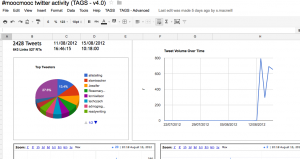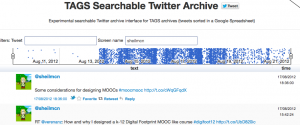Do you ever get the feeling that you are living in a parallel universe? I do. Particularly this week when the “Major players in the MOOC Universe” infographic was published by The Chronicle of Higher Education this week. It was retweeted, google+’ed everywhere almost instantly. But this wasn’t a view of the MOOC universe I know of, there were quite a few bits missing. A bit like the “World Series” this was an almost completely U.S centric view. The big bang MOOC moment certainly didn’t happen slightly north of this universe.
Despite the efforts of informed commentators such as Audrey Watters, to correct the new revisionism of the history of MOOCs, the U.S centric vision seems to be winning out. Martin Weller’s response to Donald Clark’s take on MOOC developments eloquently states a number of my concerns about revisionism and the development of MOOCs and the so called MOOC wars.
But I can sort of see myself in this universe, all be it, in a very small dark corner. I can see, and know who the “big shiny lights” are in the centre, and dream of being part of the rebel alliance, and becoming an apprentice of Obi Weller Kenobi . . .
Yesterday though I felt almost like I had crossed into the 13th dimension. I entered a place where no-one had heard of MOOCs. Yes that’s right – they hadn’t heard of MOOCs. My colleague Lorna Campbell and I had been invited to the Scottish eLearning Alliance Local Authority SIG meeting to give an overview of our work. Lorna spoke about open educational resources, and as is my want of late, I did a bit about MOOCs. Unsurprisingly for increasingly cash strapped local authorities the free part of open was very attractive. Those in charge of developing and running training programmes are always looking for new ways to enhance their offerings. However as the discussion progressed it became clear that there is still one key missing ingredient that all the open content and courses in universe(s) don’t include, and that is time. You need time to engage with learning. Although online provision of education/resources has fundamentally changed access points, it hasn’t meant that we need less time to engage.
As you know dear reader, I have done my fair share of MOOCing over the past few months. It’s probably been the best (well actually it’s been the only) PDP I’ve done in my eight years with Cetis. But I am in an incredibly privileged position where I have been able to combine professional and personal development. I have been able to legitimately use some work time to contribute to a number of courses, and in turn in my own small way contribute to some of the wider discourse and dialogue. So although I was delighted to read that Coursera are now going to be providing course for K12 teachers, I couldn’t help but have a slight sinking feeling of this being staff development on the cheap. Will teachers be given some legitimate study time and recognition to take part or will it just be the really motivated ones (who probably aren’t the ones who really need this time of development) that will just “find the time” to take part? Will there be state wide flipped classrooms for teacher staff development ? Wouldn’t it be great if there was?
There’s also a huge assumption that everyone has the (digital) literacies needed to engage successfully with any kind of online learning. This was a key concern for some of the people at yesterday’s meeting. There’s a reason distance learning providers such as the OU have developed extensive study skills resources for their students. A MOOC on MOOCing isn’t daft idea, it just sounds slightly daft when you say it out loud.
Anyway I guess to end this slightly rambling post, that we need to remember that despite the hype in “our” universe(s), there’s a whole set of parallel universes that haven’t heard about MOOCs yet. They could very well benefit from MOOCs and from open education in general, but education is more than resources and courses. It’s about human interaction and time. In our rush to create new universes let’s not forget these universal principles and cherish the time that a University degree gives to students and indeed the time that any educational experience deserves.

